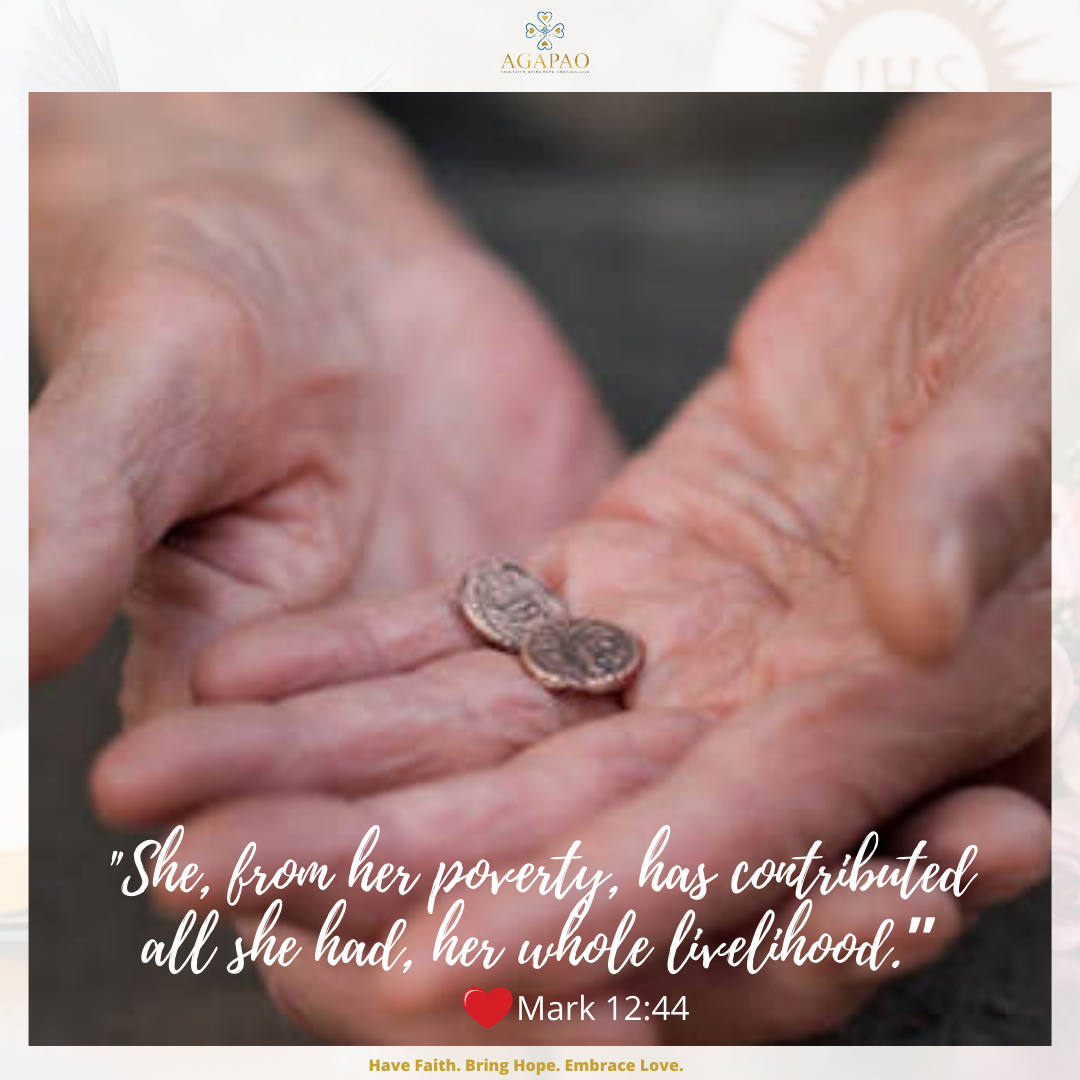
Gospel Lectio Divina for the 32nd Sunday in Ordinary Time, Nov. 7, 2021
In the course of his teaching Jesus said to the crowds,
"Beware of the scribes, who like to go around in long robes
and accept greetings in the marketplaces,
seats of honor in synagogues,
and places of honor at banquets.
They devour the houses of widows and, as a pretext
recite lengthy prayers.
They will receive a very severe condemnation."
He sat down opposite the treasury
and observed how the crowd put money into the treasury.
Many rich people put in large sums.
A poor widow also came and put in two small coins worth a few cents.
Calling his disciples to himself, he said to them,
"Amen, I say to you, this poor widow put in more
than all the other contributors to the treasury.
For they have all contributed from their surplus wealth,
but she, from her poverty, has contributed all she had,
her whole livelihood."
MEDITATE
“Beware of the scribes, who like to go around in long robes and accept greetings in the marketplaces, seats of honor in synagogues, and places of honor at banquets.”
Throughout his ministry, Jesus tends to condemn hypocrisy more than sin. In fact, he invites the sinner and often shuns hypocrites. One could easily assume that Christ is fine with sin, as long as we repent (because he talks about repentance often as well). But that is not the case. Jesus is not okay with sin. Jesus knows that we all sin, and his indignation toward hypocrites is due to the fact that they think they are righteous. “We all have sinned and fallen short of the glory of God,” writes St. Paul in his letter to the Romans. The key distinction between the poor widow and the scribes who want to be recognized for their religiosity, is in the humility of the widow--in other words, her ability to see the truth that all she has comes from God. If the scribe thinks he has no sin, then he is guilty of the sin of lying. He is not being honest with God or even himself, because if he took a close look at his own heart and soul, he would see his hubris. But to the scribe, his hubris is a small matter compared to the sins of others. Because of this, he will remain far from God.
“They devour the houses of widows and, as a pretext, recite lengthy prayers.”
This quote is often used to criticize the Rosary, so it’s important to note that Jesus is not talking about meditative prayer--which is what the Rosary is. Yes, we recite prayers in the Rosary, but the prayers help us focus on the Mysteries. The Rosary is about the life of Christ. In that sense, it is designed to take our minds off of ourselves. Jesus is talking about public displays of piety that lack genuine contrition and are self-centered. The reason these scribes recite lengthy prayers is to make them seem justified in the eyes of the community when they “devour the houses of widows.” They do not seek a closer relationship with God. Jesus looks at our hearts, not our external words of prayer. Prayer is a way of connecting with God. The scribes thought their prayers in and of themselves made them righteous. But the prayers were empty because the scribes did not genuinely reach out to God. The prayers simply made them feel better about themselves. Their prayers were self-oriented, and so they could not reach God through their prayers since their self-righteousness was in their way.
They will receive a very severe condemnation
Due to human nature, we all tend to be selfish at least every now and then. That is why Christ lovingly calls us to himself to repent. He is not singling anyone out when he calls us to repentance. It is something he expects of all of us so we can draw closer to him and find deeper truth about ourselves and all of existence. But Jesus is upset with the scribes not only because they are being selfish in their prayers. He is especially upset with them because the scribes use the prayers, traditions, temples, and synagogues in their selfish pursuits, to appear righteous in the eyes of those who truly seek God--thereby leading many astray. The word “scandal” comes from the Greek word “skandalon”, which means “stumbling block”. In other words, when the scribes publicly displayed their false piety and then acted viciously it was most likely a stumbling block for those who were trying to persevere in faith. Many Jews who observed these scribes while trying to be more faithful probably asked something like, “If those in the upper echelons of the religious community could get away with sinful acts, what does that say about our religion in general?” To persevere in faith, it helps to have people around you who are showing you how to do so. The scribes were doing the opposite of that. So Jesus is especially upset with the scribes because they are using religion for their own ends, and deterring people from practicing true piety. In fact, we can notice even today the effects of these scribes. Even the word “pious” itself has a derogatory connotation in many circles partially because of them. What people often think of when they think of piety today is false piety. We have the scribes in this Sunday’s Gospel to thank for that. Because of their false witness and bad example in the religious community, true believers have to search even harder for God, and search even deeper in their souls for what it truly means to be pious. Let’s not lose sight of true piety just because these scribes set such a bad example in their vain attempts to practice it, because to be pious is a noble thing and it ought to be encouraged.
“she, from her poverty, has contributed all she had, her whole livelihood.”
It’s tough to tithe. Consider how tough it must have been for this poor widow to give all she had to the Temple. What faith it must have taken! Where would she get her next meal? How would she pay her taxes? This is an act of not only giving all her money to God, but all her hope as well. As Christ said, she gave her whole livelihood. She depended on God so much that she believed he would sustain her life. What a far cry my faith is from that of the poor widow. God has always provided for me, especially when I’m generous and charitable. And yet, I still hold back. I still don’t give nearly as much as I should back to him. The poor widow relied on God so completely that she was content to give up whatever she had just to show God her faith and gratitude for sustaining her up to that point. It would be interesting to learn what happened to this widow afterwards. She probably did not receive any great fortune here on earth. It is certain that she stored up great treasures in heaven, though.
PRAY
Lord,
No matter how hard things get, you always sustain your children. Thank you for your providence. Please give me the faith to store up treasures in heaven rather than here on earth. Please show me the beautiful and wondrous glories of your kingdom. I am weak and you are strong. I depend on you to show me the way, because without you I am a lost soul in the desert thirsting for purpose. You are the oasis. Help me to see that when the light seems faintest, like it probably did for the poor widow, all I need to do is have faith in you and you will guide me to the living well. In Jesus’ name, Amen.
LISTEN
God’s ways are not our ways. Our ways would say it’s foolish to give all our money away like the poor widow did in this Sunday’s Gospel. But God is inviting us to a completely different world that casts aside the worries and concerns of this world. The worries this world gives us keep us from hearing God’s voice. The main reason Jesus wants us to let go of the treasures of this world is so that we could not only rely on him more completely, but also see and hear him more clearly. What can I let go of so that I can more clearly hear God’s voice?
Kilby is a freelance writer from New Jersey and managing editor of Catholic World Report


